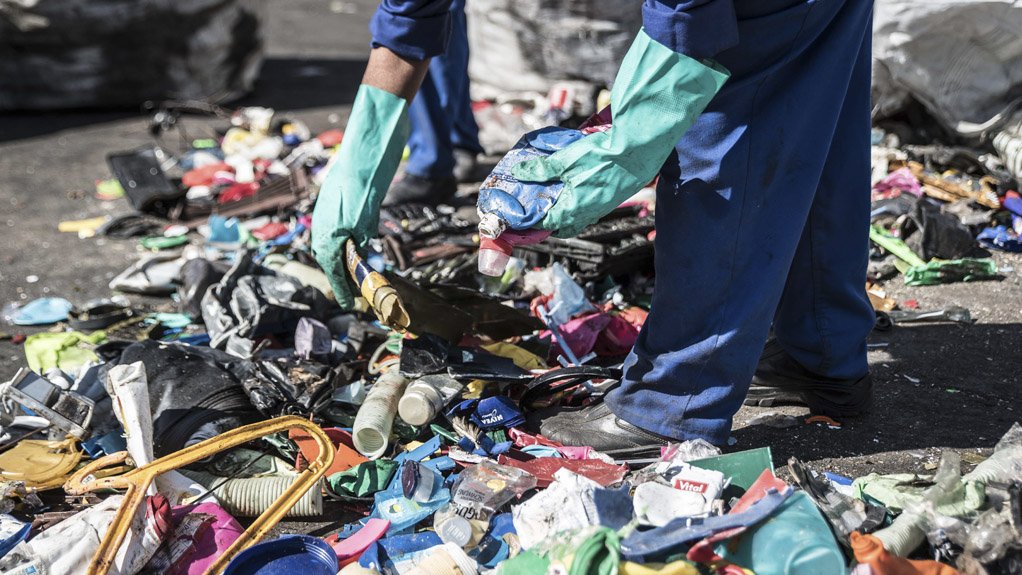Separation at source to improve recycling standard


INVESTMENT An additional R150-million investment in project funding is needed over the next four years to enable Polyco to achieve the recycling target of 234 000 t, or 35%, recycled polyolefin by 2020
Nonprofit polyolefin recycling company Polyco is focussing renewed attention on building strong value-chain partnerships with recyclers, converters and brand owners by providing funding support for projects that will facilitate the move into high-quality critical market applications.
To support this business strategy, Polyco CEO Mandy Naudè tells Engineering News that it has appointed a second business development manager who will focus on the Gauteng and Inland region.
The company will now call for funding request proposals across the entire recycling value chain twice a year, while expanding its support model to include the end-use development category for project support to increase demand for recycled material.
“We identified that the only recyclers that have not really been so negatively affected in the past few months by the tough market conditions and impact of the weakening Rand, are those that are selling a quality recycled polymer in critical market end uses,” Naudè notes.
She points out that Polyco has started to review its business model in response to the current recycling trading conditions, which affected the volume growth projections of their project partners. The business focuses on educating consumers about recycling and building key relationships in the industry, which is essential for the success of recycling in South Africa.
Naudè states that an additional R150-million investment in project funding is needed over the next four years to enable Polyco to achieve the recycling target of 234 000 t, or 35%, recycled polyolefin by 2020, as set by the Industry Waste Management Plan.
“A lack of a consistent stream of clean recyclables has been one of the challenges last year. While a large quantity of the materials for recycling was recovered by waste pickers from landfill sites, much of this was contaminated and of poorer quality. To prevent this, effective separation-at-source infrastructure needs to be implemented throughout the country,” she notes.
Other factors that remain detrimental to the recycling industry include the inability of many recyclers to supply a certificate of conformance to quality standards, high operational costs, ageing machinery and lack of investment in infrastructure and technology.
“Many recyclers are selling recycled material in saturated commodity markets that do not require quality tested material. However, when market conditions get tough, these markets are the first ones affected and volumes are lost.”
Polyco and the other material recovery organisations (MROs) have become crucial industry bodies for business to demonstrate to government that the plastics industry in South Africa is committed to meeting government’s environmental expectations, she highlights.
“We act as the conscience of the plastics industry by getting membership buy-in from plastic producers and spending levy funds on worthy recycling initiatives that increase the recycling rate of plastic.”
“We are actively encouraging brand owners and retailers to become associate members of MROs such as Polyco, Petco and the Polystyrene Packaging Council to ensure that their companies buy only from packaging converters who pay their monthly levies to these MROs, which, in turn, use the funds to establish and grow recycling rates for their specific material streams.”
She notes that there are still many free riders in the packing industry that are not adhering to the “producer pays” principle, and who don’t belong to an MRO nor support the industry’s efforts to achieve its sustainability targets. Imminent legislation changes will hopefully address this issue.
Naudè remains optimistic about the future even though there is a large degree of uncertainty with government debating the Intention to Call for Plans Bill, the Pricing Strategy Bill and the Carbon Tax Bill, all three of which will impact on recycling across industries.
Naudè adds that since Polyco actively started its operations in 2014, the company has invested more than R19-million in various separation, collection, sorting and recycling projects in the country to increase the recycling of polyolefin plastic packaging from 159 000 t in 2013 to 177 000 t in 2015
This has also had a direct positive impact on employment, as the companies that Polyco has partnered with, were enabled to expand and grow their operations in urban and rural areas of South Africa. By 2020, Polyco expects that R70-million of the total R166-million project spend will have been sourced from repaid loans through its self-sustaining funding model.
“Our strategic focus continues to be to provide support to recyclers to equip their operations to move into quality critical market applications where there is an opportunity for margin enhancement, allowing for reinvestment into their operations to meet future demand,” she concludes.
Article Enquiry
Email Article
Save Article
Feedback
To advertise email advertising@creamermedia.co.za or click here
Press Office
Announcements
What's On
Subscribe to improve your user experience...
Option 1 (equivalent of R125 a month):
Receive a weekly copy of Creamer Media's Engineering News & Mining Weekly magazine
(print copy for those in South Africa and e-magazine for those outside of South Africa)
Receive daily email newsletters
Access to full search results
Access archive of magazine back copies
Access to Projects in Progress
Access to ONE Research Report of your choice in PDF format
Option 2 (equivalent of R375 a month):
All benefits from Option 1
PLUS
Access to Creamer Media's Research Channel Africa for ALL Research Reports, in PDF format, on various industrial and mining sectors
including Electricity; Water; Energy Transition; Hydrogen; Roads, Rail and Ports; Coal; Gold; Platinum; Battery Metals; etc.
Already a subscriber?
Forgotten your password?
Receive weekly copy of Creamer Media's Engineering News & Mining Weekly magazine (print copy for those in South Africa and e-magazine for those outside of South Africa)
➕
Recieve daily email newsletters
➕
Access to full search results
➕
Access archive of magazine back copies
➕
Access to Projects in Progress
➕
Access to ONE Research Report of your choice in PDF format
RESEARCH CHANNEL AFRICA
R4500 (equivalent of R375 a month)
SUBSCRIBEAll benefits from Option 1
➕
Access to Creamer Media's Research Channel Africa for ALL Research Reports on various industrial and mining sectors, in PDF format, including on:
Electricity
➕
Water
➕
Energy Transition
➕
Hydrogen
➕
Roads, Rail and Ports
➕
Coal
➕
Gold
➕
Platinum
➕
Battery Metals
➕
etc.
Receive all benefits from Option 1 or Option 2 delivered to numerous people at your company
➕
Multiple User names and Passwords for simultaneous log-ins
➕
Intranet integration access to all in your organisation



















